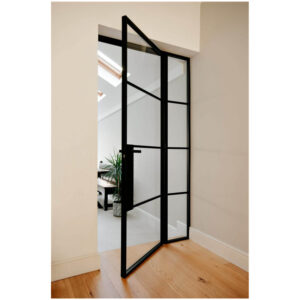Yes, interior steel doors are often customizable in terms of size, design, and hardware options.
Here’s a breakdown of the customization possibilities:
Size: Interior steel doors can be customized to fit specific openings. They can be manufactured in various standard sizes or made-to-measure according to the dimensions provided. Custom sizing ensures a proper fit and seamless integration within the space.
Design: Interior steel doors can be customized in terms of design to match the desired aesthetic or architectural style. Some manufacturers offer a range of design options, including different panel configurations, patterns, or decorative elements. This allows for personalization and coordination with the overall interior design scheme.
Finish: Steel doors can be customized with different finishes to achieve the desired appearance. They can be painted in various colors or coated with specialized finishes, such as powder coating or laminate, which provide durability and enhance the visual appeal. The finish options can be selected to complement the interior décor or create a specific look.
Glass Inserts: Many interior steel doors feature glass inserts or windows. The type, shape, and size of the glass inserts can be customized to suit individual preferences. This customization option allows for the incorporation of natural light, visibility, or privacy considerations.
Hardware: Interior steel doors can be customized with a wide range of hardware options. This includes handles, hinges, locks, and other accessories. The hardware selection can be tailored to match the desired style, functionality, interior steel door and security requirements. Different finishes, such as brushed or polished metal, can also be chosen to complement the overall door design.
Additional Features: Depending on the manufacturer and specific requirements, interior steel doors can be customized with additional features. This may include soundproofing materials, fire-rated properties, or specialized hardware for accessibility needs.
It’s important to note that the extent of customization options may vary depending on the manufacturer, supplier, or specific product lines. Working with a reputable supplier or manufacturer can provide more insights into the available customization possibilities and help create interior steel doors that meet specific design and functional requirements.
Can you provide examples of common applications or spaces where interior steel doors are commonly used?
Here are some examples of common applications or spaces where interior steel doors are commonly used:
Commercial Buildings: Interior steel doors are widely used in various commercial buildings, including offices, retail stores, restaurants, and hotels. They can be utilized as entrance doors, office partition doors, storage room doors, or fire-rated doors, depending on the specific requirements of the space.
Industrial Facilities: Interior steel doors are commonly found in industrial facilities such as warehouses, factories, and manufacturing plants. They are used for separating different areas, creating secure zones, or providing access control within the facility.
Educational Institutions: Interior steel doors are frequently used in schools, colleges, and universities. They can be installed in classrooms, laboratories, gymnasiums, or other areas where durability, security, and resistance to wear and tear are important considerations.
Healthcare Facilities: Interior steel doors are suitable for healthcare facilities such as hospitals, clinics, and laboratories. They are used in areas that require high hygiene standards, such as operating rooms, clean rooms, or areas with specialized equipment.
Public Buildings: Interior steel doors can be found in various public buildings, including government offices, libraries, museums, and community centers. They provide security, durability, and fire resistance in these spaces.
Residential Spaces: While less common in residential settings compared to other types of doors, interior steel doors can be used in specific applications such as basements, utility rooms, or for added security in high-end homes.
Emergency Exits and Fire-Rated Areas: Interior steel doors are often utilized as emergency exits or in fire-rated areas of buildings. These doors are designed to meet strict safety regulations and provide protection in the event of a fire.
Utility Rooms and Mechanical Spaces: Interior steel doors are commonly used in utility rooms, mechanical rooms, or areas that house electrical equipment, HVAC systems, or utility connections. They provide protection, security, and soundproofing in these utility spaces.
Hospitality Industry: Interior steel doors are used in hotels, resorts, and hospitality establishments for their durability and security. They can be found in guest rooms, service areas, or back-of-house locations.
Retail Spaces: Interior steel doors are suitable for retail environments, particularly in areas that require added security, such as stockrooms or areas with high-value merchandise.
These are just a few examples, and the use of interior steel doors can vary depending on specific building requirements and industry standards.

